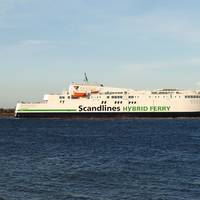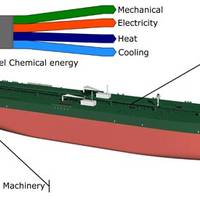Hybrid Ferry uses Energy Storage System from Corvus Energy
Scandlines has named their newest hybrid ferry, the M/V Copenhagen. As part of Scandlines’ ambitious environmental strategy, the new hybrid ferry will join the world’s largest fleet of hybrid ferries, utilizing a low emission and fuel saving diesel electric hybrid propulsion system powered by a Corvus Energy ESS (Energy Storage System). The M/V Copenhagen is the sixth Scandlines hybrid ferry to utilize a Corvus ESS. This new hybrid ferry will soon join its sister ship M/V Berlin, also powered by a Corvus ESS, in servicing the crossing between Rostock, Germany and Gedser, Denmark. The M/V Copenhagen is 169.5m long and 25.4m wide, providing double the capacity for vehicles (460 cars or 96 transport trucks), and the modern, spacious onboard facilities have enough space for 1,300 passengers.
Scandlines’ New Hybrid Ferry Named MV Copenhagen

The second of Scandlines’ two new hybrid ferries for the Rostock-Gedser route was named M/V Copenhagen during a ceremony at the Danish shipyard FAYARD A/S on October 28, 2016. In his speech to the some 180 guests in attendance, Thomas Andersen, CEO of FAYARD A/S, thanked Scandlines for the confidence which the shipping company has shown the yard and he compared the new ferry with Hans Christian Andersen’s ugly duckling that finally turned into a beautiful swan. The new ferry M/V Copenhagen…
DNV GL Introduces Energy Efficiency Methodology

DNV GL presents a novel approach that overcomes challenges of assessing on board energy efficiency in a consistent manner. As a result, priorities for improvement can be determined accurately. In a new report released, DNV GL answers the question: How can a ship manager identify the biggest sources of useful energy that are currently being wasted on their ships? “Ship operations and environmental legislation have become more complex, and it has become increasingly difficult to assess or even define efficiency with consistency and accuracy…





